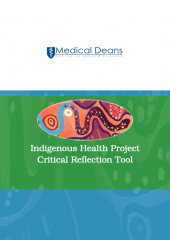The Critical Reflection Tool
The CRT is a dynamic document that addresses broad contextual issues that impact on Indigenous health curriculum development. The CRT can be understood as a management tool for faculties and schools where responsibility for Indigenous health is shared across the organisation. Its purpose is to support medical schools implement, monitor and sustain a nationally agreed Indigenous health curriculum framework and to adopt initiatives related to Indigenous student recruitment and support through to graduation.
The CRT is designed to encourage internal reflection, critical thinking, a review of current practice, and a focus on future planning among Australian and New Zealand medical faculties/schools. It is intended that the CRT will stimulate internal discussion that allows faculties/schools to identify areas of strength and areas that need improvement to identify the drives for, and barriers to change, and what ought to be done next and why. The tool has been designed to encourage coordination and a ‘whole-of-school partnership approach.
It is not intended that the CRT be an evaluation or reporting tool, but an internal working document that allows for reflection on progress. Such a reflective process may assist in developing learning and collegiate culture that will improve Indigenous health teaching and learning outcomes.
The CRT was developed by the Medical Deans Indigenous Health Project Staff with the assistance of a Working Party comprised of Indigenous and non-Indigenous academics and Australian Indigenous Doctors’ Association (AIDA) representatives.
Download the Medical Deans Indigenous Health Project Critical Reflection Tool (Pilot Study)
The CRT draws upon and refers to three key documents:
- CDAMS Indigenous Health Curriculum Framework
- Healthy Futures: Defining Best Practice in the Recruitment and Retention of Indigenous Medical Students
- The Australian Medical Council (AMC) Guidelines: Assessment and Accreditation of Medical Schools: Standards and Procedures 2006
The CRT provides prompts for structured responses to key questions in order to assist in implementing the principles and guidelines recommended by these documents.
For further information about the CRT contact lime-network@unimelb.edu.au
This suite of tools has been developed by the Leaders in Indigenous Medical Education (LIME) Network to assist schools to internally review and map their Indigenous health initiatives across the areas of workforce development, student recruitment and retention, research, community partnerships and curriculum development and implementation.
Based on the Australian Medical Council (AMC): Accreditation Standards for Assessment and Accreditation of Primary Medical Education Providers, and the Committee of Deans of Australian Medical School (now Medical Deans Australia and New Zealand) Indigenous Health Curriculum Framework 2004 (IHCF), the tools aim to:
- Assist with preparation for AMC accreditation
- Assist with mapping Indigenous health curriculum using the IHCF
- Assist with tracking progress of Indigenous health initiatives over time
- Provide the opportunity to advocate for the development, retention and sustainability of Indigenous health initiatives
- Provide a shared language relating to Indigenous health initiatives across all medical schools in line with the IHCF
There are three tools that schools may choose to utilise together or separately at any time to assist in developing and/or reviewing their Indigenous health initiatives:
- Periodic Systemic Review of Indigenous Health
- Indigenous Health Curriculum Mapping Tool: Academic
- Indigenous Health Curriculum Mapping Tool: Student
Once the tools have been completed, a summary of the outcomes as well as the results are provided to the user who can also export the results into an excel spreadsheet. When the tools are used over time, it is possible to compare results to see where improvements have been made and where the gaps in content remain.






